| Listing 1 - 10 of 12 | << page >> |
Sort by
|
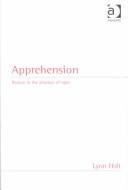
ISBN: 0754606643 Year: 2002 Publisher: Aldershot Ashgate
Abstract | Keywords | Export | Availability | Bookmark
 Loading...
Loading...Choose an application
- Reference Manager
- EndNote
- RefWorks (Direct export to RefWorks)
Intuitie --- Intuition --- Mind --- Raison --- Rationaliteit --- Rationality --- Rationalité --- Reason --- Rede --- Intellect --- Rationalism --- Intuition (Psychology) --- Intuitionalism --- Cognition --- Insight --- Intuition. --- Reason.
Book
ISBN: 0802029736 Year: 1995 Volume: *2 Publisher: Toronto University of Toronto
Abstract | Keywords | Export | Availability | Bookmark
 Loading...
Loading...Choose an application
- Reference Manager
- EndNote
- RefWorks (Direct export to RefWorks)
Intuitie --- Intuition --- Transcendantal [Le ] --- Transcendentale [Het ] --- Transcendentalism --- Aesthetics --- Philosophy --- Philosophy, Modern --- Idealism --- Intuition (Psychology) --- Intuitionalism --- Cognition --- Insight --- Beautiful, The --- Beauty --- Esthetics --- Taste (Aesthetics) --- Art --- Criticism --- Literature --- Proportion --- Symmetry --- Psychology --- Kant, Immanuel --- Kant, Immanuel, --- Radio broadcasting Aesthetics
Book
ISBN: 3937202552 9783937202556 Year: 2004 Volume: 1 Publisher: Frankfurt am Main Ontos
Abstract | Keywords | Export | Availability | Bookmark
 Loading...
Loading...Choose an application
- Reference Manager
- EndNote
- RefWorks (Direct export to RefWorks)
Book
ISBN: 9783110228427 9783110228434 3110228424 Year: 2010 Volume: 162 Publisher: Berlin De Gruyter
Abstract | Keywords | Export | Availability | Bookmark
 Loading...
Loading...Choose an application
- Reference Manager
- EndNote
- RefWorks (Direct export to RefWorks)
Kant, Immanuel --- Intuition --- Knowledge, Theory of --- Reason --- Causation --- Kant, Immanuel, --- Mind --- Intellect --- Rationalism --- Epistemology --- Theory of knowledge --- Philosophy --- Psychology --- Intuition (Psychology) --- Intuitionalism --- Cognition --- Insight --- Causality --- Cause and effect --- Effect and cause --- Final cause --- Beginning --- God --- Metaphysics --- Necessity (Philosophy) --- Teleology --- Kant, Immanuel, - 1724-1804 - Kritik der reinen Vernunft
Book
ISBN: 3484181036 9783484181038 Year: 1989 Volume: 103 Publisher: Tübingen Niemeyer
Abstract | Keywords | Export | Availability | Bookmark
 Loading...
Loading...Choose an application
- Reference Manager
- EndNote
- RefWorks (Direct export to RefWorks)
Art and literature. --- Aesthetics. --- Intuition. --- Ut pictura poesis (Aesthetics) --- Aesthetics --- Art and literature --- Intuition --- Humanism in art --- Intuition (Psychology) --- Intuitionalism --- Cognition --- Insight --- Literature and art --- Literature and painting --- Literature and sculpture --- Painting and literature --- Sculpture and literature --- Literature --- Beautiful, The --- Beauty --- Esthetics --- Taste (Aesthetics) --- Philosophy --- Art --- Criticism --- Proportion --- Symmetry --- Psychology --- Style [Literary ] --- History --- Mimesis in literature --- German language --- Style --- Radio broadcasting Aesthetics
Book
ISBN: 2747552179 Year: 2003 Volume: *51 Publisher: Paris Budapest Torino L'harmattan
Abstract | Keywords | Export | Availability | Bookmark
 Loading...
Loading...Choose an application
- Reference Manager
- EndNote
- RefWorks (Direct export to RefWorks)
Intuition --- Intuition (Psychology) --- Intuitionalism --- Cognition --- Insight --- Bergson, Henri, --- Bergson, Henri --- Bergson, Henri Louis, --- Bergson, Anri, --- Bergson, Enrico, --- Berŭgŭsong, --- Berxon, --- Bergson, Henry, --- Bergson, Henryk, --- Berŭgŭsong, Angri, --- Bergson, Enrique, --- Bergson, H. --- Bogesen, Hengli, --- בערגסאן, אנרי --- בערגסאן, אנרי, --- ברגדון, אנרי, --- ברגסון, הנרי --- ברגסון, הנרי,
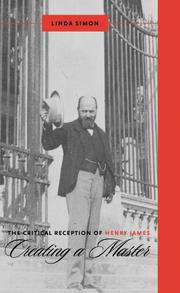
ISBN: 1571133194 9781571133199 9781571136923 1571136924 Year: 2007 Volume: *6 Publisher: Suffolk Boydell & Brewer
Abstract | Keywords | Export | Availability | Bookmark
 Loading...
Loading...Choose an application
- Reference Manager
- EndNote
- RefWorks (Direct export to RefWorks)
Although some of Henry James's contemporary critics deemed him just short of a great writer, history has elevated him to indisputable preeminence in the American canon. Linda Simon chronicles and analyzes James criticism beginning with contemporary newspaper and magazine reviews and ending with current academic criticism. The story begins in the 1870s, when critics saw James's works as mirrors of American identity and sought to establish him in the nation's evolving canon. James himself worked to secure that place with his prefaces to the standard edition of his works; Simon analyzes criticism about those prefaces. She also shows how James's reputation became contested after his death: praised by some critics for psychological insight and stylistic innovation, he was dismissed by others as socially and politically irrelevant. But beginning in the 1940s, such critics as Trilling, Rahv, Leavis, and, most influentially, Leon Edel secured James's place at the forefront of the American canon. More recently, James scholarship has focused on sexuality and gender, race and morality, and the nature of consciousness; critical trends Simon also considers. This book, the only comprehensive overview of James criticism over the past 140 years, helps readers understand the paths that that criticism has taken and how scholars and critics have built upon past work. Linda Simon is Professor of English at Skidmore College and Editor-in-Chief of 'William James Studies.' Her books include 'Genuine Reality: A Life of William James,' which was a 'New York Times' Notable Book of 1998.
James, Henry, --- Criticism and interpretation --- History. --- James, Henry --- History --- Dzheĭms, G. --- Dzheĭms, Genri, --- Jeimsŭ, Henri, --- Джеймс, Генри, --- ג׳יימס, הנרי, --- ג׳ײמס, הנרי, --- Τζειος, Χενρι, --- جميس، هينري، --- جيمز، هنرى --- LITERARY CRITICISM / American / General. --- American Canon. --- American Identity. --- American Writer. --- Canonization. --- Henry James. --- Literary Criticism. --- Psychological Insight. --- Social and Political Relevance. --- Stylistic Innovation.
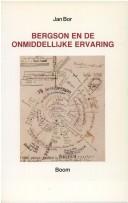
Abstract | Keywords | Export | Availability | Bookmark
 Loading...
Loading...Choose an application
- Reference Manager
- EndNote
- RefWorks (Direct export to RefWorks)
Bergson, Henri --- 1 BERGSON, HENRI --- Intuition --- -Intuition (Psychology) --- Intuitionalism --- Cognition --- Insight --- Filosofie. Psychologie--BERGSON, HENRI --- History --- -Bergson, Henri --- -Filosofie. Psychologie--BERGSON, HENRI --- 1 BERGSON, HENRI Filosofie. Psychologie--BERGSON, HENRI --- -1 BERGSON, HENRI Filosofie. Psychologie--BERGSON, HENRI --- Intuition (Psychology) --- Bergson, Henri, --- Bergson, Henri Louis, --- Bergson, Anri, --- Bergson, Enrico, --- Berŭgŭsong, --- Berxon, --- Bergson, Henry, --- Bergson, Henryk, --- Berŭgŭsong, Angri, --- Bergson, Enrique, --- Bergson, H. --- Bogesen, Hengli, --- בערגסאן, אנרי --- בערגסאן, אנרי, --- ברגדון, אנרי, --- ברגסון, הנרי --- ברגסון, הנרי,
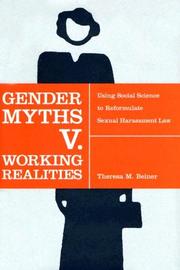
ISBN: 0814799175 0814739423 142941507X 9781429415071 9780814799178 9780814739426 Year: 2005 Publisher: New York, NY
Abstract | Keywords | Export | Availability | Bookmark
 Loading...
Loading...Choose an application
- Reference Manager
- EndNote
- RefWorks (Direct export to RefWorks)
Both the courts and the public seem confused about sexual harassment—what it is, how it functions, and what sorts of behaviors are actionable in court. Theresa M. Beiner contrasts perspectives from social scientists on the realities of workplace sexual harassment with the current legal standard. When it comes to sexual harassment law, all too often courts (and employers) are left in the difficult position of grappling with vague legal standards and little guidance about what sexual harassment is and what can be done to stop it. Often, courts impose their own stereotyped view of how women and men “ought” to behave in the workplace. This viewpoint, social science reveals, is frequently out of sync with reality.As a legal scholar who takes social science seriously, Beiner provides valuable insight into what behaviors people perceive as sexually harassing, why such behavior can be characterized as discrimination because of sex, and what types of workplaces are more conducive to sexually harassing behavior than others. Throughout, Beiner offers proposals for legal reform with the goal of furthering workplace equality for both men and women.
Sexual harassment --- Law and the social sciences --- Harcèlement sexuel --- Droit et sciences sociales --- Law and legislation --- Social aspects --- Droit --- Aspect social --- Law and the social sciences -- United States. --- Sexual harassment -- Law and legislation -- Social aspects -- United States. --- Law - U.S. --- Law, Politics & Government --- Labor Law - U.S. --- Harcèlement sexuel --- Social sciences and law --- Sexual harassment in the workplace --- Workplace sexual harassment --- Social sciences --- Sociological jurisprudence --- Harassment --- Sex role in the work environment --- United States --- Sociological aspects --- Law and social sciences --- Beiner. --- because. --- behavior. --- behaviors. --- characterized. --- conducive. --- discrimination. --- harassing. --- insight. --- into. --- legal. --- more. --- others. --- people. --- perceive. --- provides. --- scholar. --- science. --- seriously. --- sex. --- sexually. --- social. --- such. --- takes. --- than. --- types. --- valuable. --- what. --- workplaces.
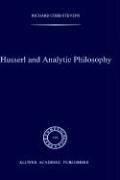
ISBN: 0792304675 9401073422 9400918887 9780792304678 Year: 1990 Volume: 116 Publisher: Dordrecht Kluwer
Abstract | Keywords | Export | Availability | Bookmark
 Loading...
Loading...Choose an application
- Reference Manager
- EndNote
- RefWorks (Direct export to RefWorks)
The principal differences between the contemporary philosophic traditions which have come to be known loosely as analytic philosophy and phenomenology are all related to the central issue of the interplay between predication and perception. Frege's critique of psychologism has led to the conviction within the analytic tradition that philosophy may best defend rationality from relativism by detaching logic and semantics from all dependence on subjective intuitions. On this interpretation, logical analysis must account for the relationship of sense to reference without having recourse to a description of how we identify particulars through their perceived features. Husserl' s emphasis on the priority and objective import of perception, and on the continuity between predicative articulations and perceptual discriminations, has yielded the conviction within the phenomenological tradition that logical analysis should always be comple mented by description of pre-predicative intuitions. These methodological differences are related to broader differences in the philosophic projects of analysis and phenomenology. The two traditions have adopted markedly divergent positions in reaction to the critique of ancient and medieval philosophy initiated by Bacon, Descartes, and Hobbes at the beginning of the modern era. The analytic approach generally endorses the modern preference for calculative rationality and remains suspicious of pre-modern categories, such as formal causality and eidetic intuition. Its goal is to give an account of human intelligence that is compatible with the modern interpretation of nature as an ensemble of quantifiable entities and relations.
Philosophy of language --- Theory of knowledge --- Husserl, Edmund --- Analyse (Filosofie) --- Analyse (Philosophie) --- Analyse linguistique (Philosophie) --- Analysis (Philosophy) --- Analysis [Linguistic ] (Philosophy) --- Analysis [Logical ] --- Analysis [Philosophical ] --- Analytical philosophy --- Analytische filosofie --- Fenomenologie --- Filosofische taalanalyse --- Intuitie --- Intuition --- Linguistic analysis (Filosofie) --- Linguistic analysis (Philosophy) --- Logical analysis --- Perceptie --- Perceptie (Filosofie) --- Perception --- Perception (Philosophie) --- Perception (Philosophy) --- Phenomenology --- Philosophical analysis --- Philosophie analytique --- Philosophy [Analytical ] --- Phénoménologie --- Psychologism --- Psychologisme --- Waarneming --- Waarneming (Filosofie) --- Husserl, Edmund, --- Phenomenology. --- Psychologism. --- Perception. --- Intuition. --- 1 HUSSERL, EDMUND --- Academic collection --- #GROL:SEMI-1-05'19' Huss --- Phenomenological psychology --- Philosophy, Modern --- Supraliminal perception --- Cognition --- Apperception --- Senses and sensation --- Thought and thinking --- Intuition (Psychology) --- Intuitionalism --- Insight --- Analysis, Linguistic (Philosophy) --- Analysis, Logical --- Analysis, Philosophical --- Analytic philosophy --- Philosophy, Analytical --- Language and languages --- Methodology --- Philosophy --- Logical positivism --- Semantics (Philosophy) --- Filosofie. Psychologie--HUSSERL, EDMUND --- 1 HUSSERL, EDMUND Filosofie. Psychologie--HUSSERL, EDMUND --- Analysis (Philosophy). --- Phénoménologie --- Husserl, Edmond --- Husserl (edmund), philosophe allemand, 1859-1938 --- Critique et interpretation --- Philosophie analytique.
| Listing 1 - 10 of 12 | << page >> |
Sort by
|

 Search
Search Feedback
Feedback About UniCat
About UniCat  Help
Help News
News